Task
Shoe Impression Virtual Lab
The Crime
The Lions football team beat their rivals 22-6 Friday night. The crowd was excited and full of energy. Fans were celebrating late into the night in the parking lot. The Lions football coach John Ryan stayed for most of the celebration, then left. Once he arrived home, he realized his cell phone had fallen out of his pocket during the celebration. He went back to the school. When he drove back to the field, it had been torn up and had fire residue at the 50 yard line. He saw tire tracks and shoe prints on the field.
The Victim
“It looked like someone had driven a vehicle in the middle of the field, done some donuts, set a bonfire, then sped off. I believe it was a truck because large tire tracks were left on the field.”

The Evidence
Footprints and deep tire tracks were all over the field . The police came and made casts of the shoe prints and tire tracks. One shoe print is very distinct, while two others are partial footprints that still may be useful.

The Suspects
Some witnesses said a group of students were planning to party on the field if the football team won Friday night.
Police have identified five students from this group who were recorded by security cameras in the area after most people left. They have the shoes each suspect was wearing that night.




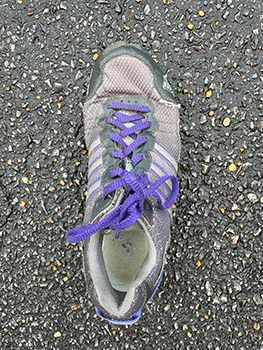
The Forensic Lab
As the crime scene investigator, you will make a cast of the shoe prints found at the crime scene. You will compare them to the shoes worn by the five suspects. Through this comparison, you can identify who may have been present when the truck was on the field and the fire was set.
Background
The Science
There are many characteristics that may be left behind in shoe prints and tire tracks. These can be matched to suspects’ shoes to establish someone was present at a crime scene.
The tread and wear pattern, shoe size, impression depth, and composition are all common identifying characteristics. Imperfections in the shoe, as well as tacks, nails, or gum stuck to the shoe, can further distinguish the shoe print.
Your Role
As a crime scene investigator, you will create three-dimensional casts of the shoe prints on the field. You can then look for similarities in the shoe patterns and other distinguishing marks to match then to the suspects’ shoes.
Reflection
How do shoe and tire track impressions help narrow the list of suspects of a crime?
The Lab Process
Equipment
Read about each piece of equipment you will use in the lab below.
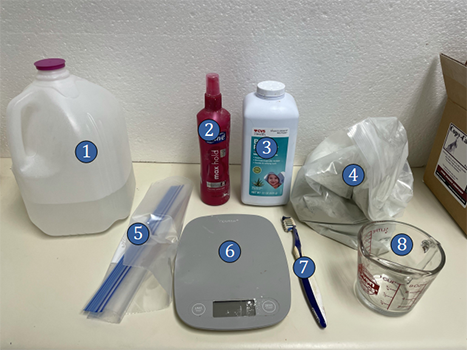
- Water: You will need to mix your Copy Cast dental stone with water.
- Hairspray: Hairspray can help set shoe prints so they hold their form when the casting material is poured in.
- Baby Powder: Baby powder allows your cast to release from the shoe print.
- Casting Material: You will use dental stone as the materials to create your cast. It hardens within an hour or so.
- Plastic Bag: You can mix and pour your material from a plastic bag.
- Balance: Use a balance to measure out your dental stone.
- Brush: A small brush will help remove dirt from the cast once it has hardened.
- Measuring Cup: Use this to measure the appropriate amount of water to mix with the dental stone / casting compound.
Lab Process
It is time to go through the laboratory process. Review the steps below to see the lab procedure.
- Remove any objects (twigs, leaves, etc.) that may have fallen into the impression. Use tweezers and try not to damage the impression. Apply hairspray to fix the print.
- Apply a thin layer of baby powder over the impression. This will act as a releasing agent so that the cast can be removed after curing without damage. Do not apply too much powder.
- Make a note of any distinguishing characteristics that the impression may have, such as a manufacturer’s insignia or obvious tread wear.
- Prepare your casting material. Begin by measuring about 2 lb. of casting material into a resealable plastic bag.
- Add 8 oz of water to each bag. Mash the casting material and water together until all the lumps have been dissolved. Add more water if needed.
- Immediately pour the casting material into the impression by clipping a small hole in the corner of the plastic bag and squeezing the material out like cake icing.
- After an hour, lift the cast from the impression by prying it up gently with a knife or a stick. Do not attempt to clean the cast until it has had time to harden.
- Let the cast harden for at least 24 hours. Clean off the excess dirt with gentle brushing. You may also gently rinse the cast with water to remove any debris. Do not soak the cast in water, as it is water-soluble.
Prepare the Print:
Open Prepare the Print in a new tab
Observe:

Mix the Compound:
Open Mix the Compound in a new tab
Pour the Cast:
Open Pour the Casting Compound in a new tab
Lift the Cast:

Viewing the Evidence
You now have casts of all of the footprints from the football field. It is time to observe them and see if any match the suspects’ shoes.


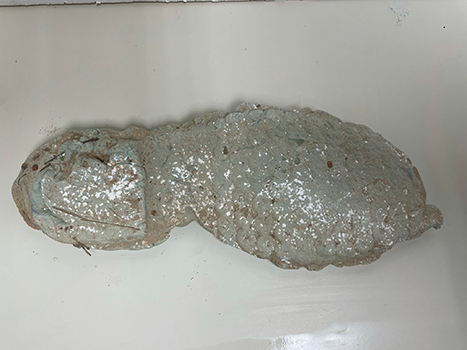

The Evidence
Analysis – Cast 1
Look at the first cast you have from the crime scene. Select a suspect’s shoes to compare. Can you find a match? Compare the top and side views. Record your observations.


Compare:





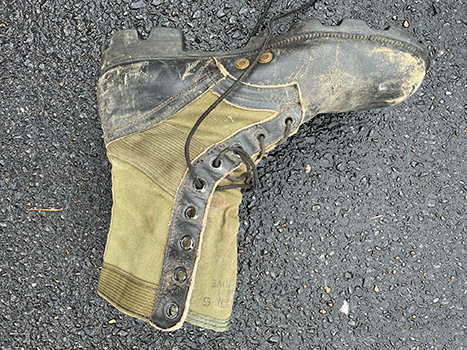




Analysis – Cast 2
Look at the second cast you have from the crime scene. Select a suspect’s shoes to compare. Can you find a match? Compare the top and side views. Record your observations.


Compare:










Analysis – Cast 3
Look at the third cast you have from the crime scene. Select a suspect’s shoes to compare. Can you find a match? Compare the top and side views. Record your observations.

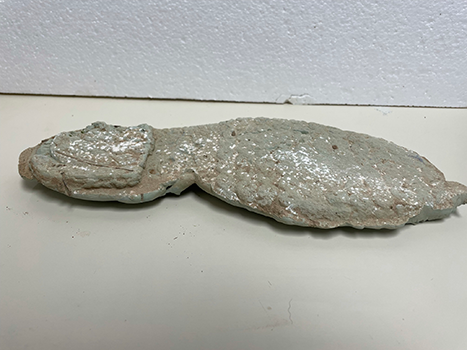
Compare:










Analysis – Cast 4
Look at the fourth cast you have from the crime scene. Select a suspect’s shoes to compare. Can you find a match? Compare the top and side views. Record your observations.


Compare:










Lab Report
At this point, you should have identified which suspects may have been present at the scene of the crime. Be sure to write all of your observations down on your lab report.
Remember to complete your lab report! Your findings will be shared with law enforcement and used, in part, to resolve or move this case forward.